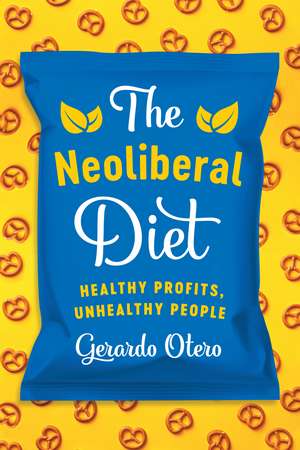The Neoliberal Diet: Healthy Profits, Unhealthy People
Autor Gerardo Oteroen Limba Engleză Paperback – 3 oct 2018
Otero shows how state-level actions, particularly subsidies for big farms and agribusiness, have ensured the dominance of processed foods and made healthful fresh foods inaccessible to many. Comparing agrifood performance across several nations, including the NAFTA region, and correlating food access to class inequality, he convincingly demonstrates the structural character of food production and the effect of inequality on individual food choices. Resolving the global obesity crisis, Otero concludes, lies not in blaming individuals but in creating state-level programs to reduce inequality and make healthier food accessible to all.
| Toate formatele și edițiile | Preț | Express |
|---|---|---|
| Paperback (1) | 273.46 lei 6-8 săpt. | |
| University of Texas Press – 3 oct 2018 | 273.46 lei 6-8 săpt. | |
| Hardback (1) | 558.62 lei 6-8 săpt. | |
| University of Texas Press – 3 oct 2018 | 558.62 lei 6-8 săpt. |
Preț: 273.46 lei
Nou
Puncte Express: 410
Preț estimativ în valută:
52.33€ • 54.78$ • 43.30£
52.33€ • 54.78$ • 43.30£
Carte tipărită la comandă
Livrare economică 05-19 aprilie
Preluare comenzi: 021 569.72.76
Specificații
ISBN-13: 9781477316986
ISBN-10: 1477316981
Pagini: 256
Dimensiuni: 152 x 229 x 20 mm
Greutate: 0.37 kg
Editura: University of Texas Press
Colecția University of Texas Press
ISBN-10: 1477316981
Pagini: 256
Dimensiuni: 152 x 229 x 20 mm
Greutate: 0.37 kg
Editura: University of Texas Press
Colecția University of Texas Press
Notă biografică
Gerardo Otero is a professor of international studies and sociology at Simon Fraser University. He is the author or editor of seven previous books, including Food for the Few: Neoliberal Globalism and Biotechnology in Latin America.
Cuprins
- List of Tables and Figures
- Acknowledgments
- Introduction: Obesity and the Neoliberal Diet
- Chapter 1. The Neoliberal Food Regime and Its Crisis: The Dynamic Factors
- Chapter 2. Neoregulation of Agricultural Biotechnology at the National and Suprastate Scales
- Chapter 3. Food and Inequality in the United States
- Chapter 4. Class Diets in the NAFTA Region: Divergence or Convergence?
- Chapter 5. NAFTA, Agriculture, and Work: Mexico’s Loss of Food and Labor Sovereignty
- Chapter 6. Globalizing the Neoliberal Diet: Food Security and Trade
- Chapter 7. Food Security, Obesity, and Inequality: Measuring the Risk of Exposure to the Neoliberal Diet
- Conclusion: What Is to Be Done?
- References
- Index
Recenzii
A closely argued sociological treatise...Otero draws on realms of data to demonstrate that neoliberal ideology—the belief that human welfare is best achieved through state-supported private enterprise—results in market-based agricultural systems that destroy subsistence farming, traditional diets, and health, while blaming the displaced victims for their own fate.
A remarkable, comprehensive book that gives the reader the sense of attending an advanced lecture series on global food politics led by a seasoned food expert…The Neoliberal Diet is critical reading for food studies scholars, but it is also useful for anyone interested in understanding transformations in the global political economy over the last several decades and their effects on food production, diets, migration, labor rights, and social movements...[The Neoliberal Diet] takes us very far in understanding the origin and scope of the problems we face and where we need to go.
This volume is a 'must read' for agriculture, food, and nutrition science and policy professionals…[a] path-breaking analysis.
Otero makes several points that warrant the attention of food policy analysts and advocates.
The cogency, clarity, and significance of Gerardo Otero's [The Neoliberal Diet] has become more apparent since the Covid-19 pandemic upended livelihoods across the globe...The Neoliberal Diet interrogates how the combined effects of neoliberal economic policy have engendered vast health inequalities around the world... Otero’s study is an ambitious critique of neoliberalism’s tendency to situate the consumer as almost solely responsible for their health and well-being...Even as the Covid-19 pandemic rages on, Otero reminds us that the neoliberal food regime has, in many ways, laid the groundwork for our present unhealth.
In the neoliberal era, cuisines and daily eating are always in conversation with state powers that both facilitate and limit access to particular ingredients. Otero offers a historical framework for thinking about how “food regimes” in Latin America have shifted over time...Although the neoliberal diet caused a crisis of obesity, Otero wisely focuses on this as a social problem that requires structural solutions, even though it causes health issues in individual bodies.
Descriere
Analyzing international data regarding food production and social inequality, especially in the NAFTA region, this book convincingly argues that neoliberal regimes, not individuals, have created the global obesity epidemic.
